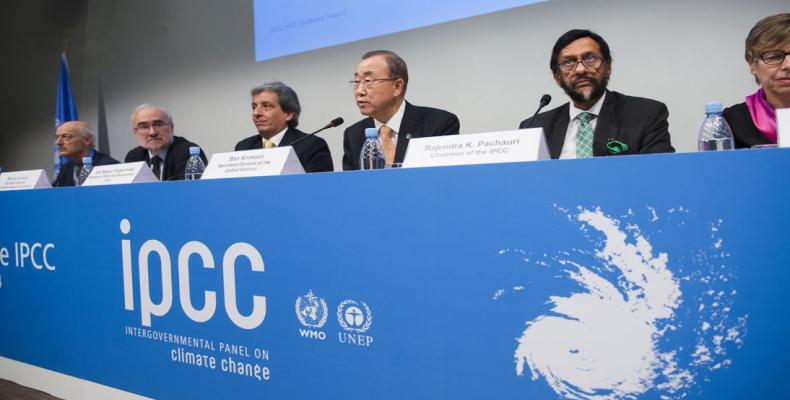Copenhagen, November 3 (RHC), -- Citing “clear and growing” human influence on the climate system, a United Nations report issued on Sunday Nov. 2, has warned that if left unchecked, climate change will increase the likelihood of severe, pervasive and irreversible impacts for people and ecosystems.
UN Secretary General Ban Ki-moon said that if the world maintains its attitude about climate change, the opportunity to keep the temperature rise below the international target of 2 degrees Celsius, “will slip away within the next decade.”
“With this latest report, science has spoken yet again and with much more clarity. Time is not on our side…leaders must act,” declared the UN chief, in Copenhagen, Denmark on an official visit that included a press conference to launch the final instalment of the Fifth Assessment Report of the Intergovernmental Panel on Climate Change (IPCC).
The so-called “Synthesis Report” confirms that climate change is being registered around the world and warming of the climate system is unequivocal. Since the 1950s many of the observed changes are unprecedented over decades to millennia, the report says.
“Our assessment finds that the atmosphere and oceans have warmed, the amount of snow and ice has diminished, sea levels have risen and the concentration of carbon dioxide has increased to a level unprecedented in at least the last 800,000 years,” said Thomas Stocker, Co-Chair of IPCC Working Group I, which participated in the compilation of the final report along with two other expert working groups.
Calling the report the “most comprehensive assessment of climate change” ever carried out, the Secretary-General urged worldwide action in light of its stark findings, saying that “even if emissions stopped tomorrow, we will be living with climate change for some time to come.”
Ban Ki-moon said the report found that the world is largely very ill-prepared for the risks of a changing climate, especially the poor and most vulnerable who have contributed least to this problem.
“I have seen for myself those rapidly melting glaciers, most recently in Greenland together with the Prime Minister of Denmark,” he said, emphasizing that though he is not a scientist he has traveled the world over, “to see the impact for myself and…add to the voices of scientists in a political way, as a common man.”
Yet, the “good news is that if we act now, we have the means to build a more sustainable world,” he said, explaining that quick and decisive action, that draws on many readily available tools and technologies, can put the world on the right track. Renewable energy sources are increasingly economically competitive. Energy efficiency has long proven its value. It was a myth that climate action would be costly, he said, stressing that in fact, inaction “will cost much, much more,” he added.
R. K. Pachauri, Chair of the IPCC, underscored that the means to limit climate change are at had. “The solutions are many and allow for continued economic and human development. All we need is the will to change, which we trust will be motivated by knowledge and an understanding of the science of climate change.”
Speaking later at the Copenhagen Energy Security Dialogues, the Secretary-General applauded the global vision of European Union leaders who had taken decisive action to cut greenhouse gas emissions by 40 per cent from by 2030.
“This is one of the major achievements immediately after the Climate Change Summit which I convened,” in late September, said the UN chief, adding that while he has made the issue one of the Organization's top priorities, he wanted to broaden the scope of measures aimed at tackling it.
Indeed as climate change “is not just a matter for environmentalists and/or scientists. It is a major development challenge that can also lead to serious security threats”, Ban said, noting that mobilizing for climate change is also mobilizing for sustainable development.
As such, the United Nations would focus on three linked priorities for next year: accelerating continued efforts to meet the targets of the Millennium Development Goals (MDGs); shaping a “bold and ambitious” post-2015 development agenda by the end of next year; and agreeing a meaningful climate change agreement by December next year in Paris.
“A transformative approach to energy can drive all these priorities to a successful realization,” of those aims, said the Secretary-General, noting that the Sustainable Energy for All initiative he had launched in 2011is mobilizing governments, businesses, finance and civil society to transform the world's energy systems.
“The United Nations is bringing the world together on energy because energy is central to our future well-being as a human family,” he said.


